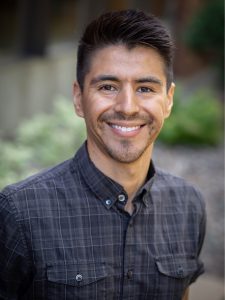 By Eric Howard
By Eric Howard
What life experiences have defined your leadership? For me, it has been my work at the synod.
Monday, August 6, 2018, was my first day as executive assistant to the bishop. At the time, it was opaque how administrative work could become a call to leadership. Navigating office challenges during the pandemic showed me that organizational leadership is about providing stability, listening, and making people feel heard in decision-making. Navigating an internal call for racial reckoning as a synod staff in the aftermath of George Floyd’s murder required a different kind of leadership.
Those who know me know I’m a transracial, international adoptee from Mexico. When I came to the U.S. at age four, I became the son of a single-parent mother and the oldest of three siblings. Because of my experience growing up in a white, middle-class family with American traditions, I thought I was well equipped to navigate cultural change with brown skin in a predominately White institution. The truth is: I faced many of the same challenges my siblings of color face in our 97% white ELCA.
“Culture change for inclusion can’t be an intellectual exercise; it’s about survival.”
For example, I learned just how uniquely exhausting culture change is as a person of color. Why is that? For me, culture change for inclusion can’t be an intellectual exercise; it’s about survival. I learned – and continue to learn – the art of pacing myself, balancing the urgency of change with the patience to meet people where they are. I’ve also learned the value of “giving back the work,” a leadership technique of getting training and tools to help others connect abstract commitments for inclusion to concrete strategies (like SMARTIE, the IDI, and REIT).
Focus is also challenging. As the “staff lead” on our Intercultural Equity Lens work, I constantly asked myself: “What 10 percent of the pie (the pie that represents the whole work of equity) am I most uniquely positioned to have an impact on?” This question helped me stay focused on my goal, clear on what I could say “yes” and “no” to, and what my work was vs. other people’s work. In a staff IDI session, our facilitator, Dr. Okokon Udo, asked us: “Who are you when you give yourself full permission?” Reflecting on that question has helped me be more honest as a leader, screening the difference between who I am and what I think other people want me to be.
MY POSITIONALITY HAS ALSO allowed me to see a paradox: Well-meaning intentions to build cultures of inclusion met with confusion and, at times, distaste. Take the fine line between inclusion and tokenism, for example. Perhaps a person of color is asked to join a predominantly White church committee or represent the church at a public event. Do they feel safe and welcome to influence what they’re being invited to? In spaces where White culture is strongest and power is most concentrated (e.g., governing councils, finance committees, etc.), psychological safety to speak against the norm may be absent. Some research shows the threshold for change happens when at least 25% of a minority group is represented.
One way of looking at it is: It’s tokenism if that threshold isn’t met. Given these realities, I find that inclusion is both about being clear on what you’re inviting people into and proactively designing spaces where people feel enough psychological safety for new voices and leadership to blossom.
“I learned just how uniquely exhausting culture change is as a person of color.”
I see this kind of inclusion work as necessary and complementary to “White allyship.” To me, being a White ally is about sharing the burden of racism. Some questions and challenging viewpoints about tokenism, biases, and white fragility are most effective when addressed between White colleagues. I’ll gently suggest that if you’re not uncomfortable in that conversation, you may need to dig deeper.
Once again, the Lutheran church has shaped and defined my leadership capacity in ways I will forever be grateful. As I say goodbye to this work, I thank you all for a new gift and sense of leadership. Thank you for this moment of service and for allowing me to lead in a compassionate place.

